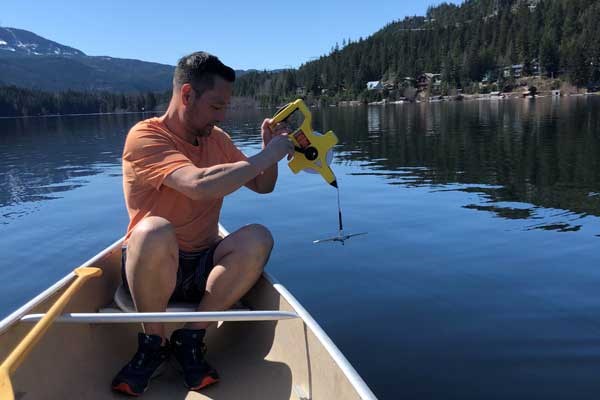What is happening once a week when a Whistler resident rows out to the deepest part of Alpha, Nita, Alta and Green lakes, or goes to the end of the clothes-optional dock on Lost Lake?
At each location, water-quality data is being collected. For one measure, a black and white circular disc 25-centimetres in diameter and attached to a tape measure is lowered down into the lake until it is no longer visible. This depth is a measure of water clarity.
Those doing the measuring are all volunteers with the Whistler Lakes Conservation Association (WLCA), which formed in 2020 to help conserve and protect Whistler’s five main lakes. The Association works with the Resort Municipality of Whistler, the BC Lake Stewardship Society (BCLSS) and the Ministry of Environment to achieve those goals.
Increasingly, community concerns are growing about the impact of human activity in and around Whistler lakes. This includes improper land development, dock construction, inadequate septic system maintenance, excessive nutrients from fertilized lawns and poor boating practices.
For example:
• Altering the waterfront with lawns can increase erosion to the shoreline, reducing habitat and increasing sediment deposited into the lake;
• Excessive nutrients can be transported into water due to runoff from fertilized lawns and septic systems that are not maintained properly. This may result in algae blooms, excessive growth of aquatic plants, decrease in water clarity, lower levels of dissolved oxygen, and increased levels of coliform and E. coli bacteria;
• Building a dock can impact shoreline habitat, cause erosion, remove vegetation, and introduce unwanted substances to a lake if improper building materials are used;
• Poor boating practices can result in wake effects, disturbance to wildlife, excessive noise, and pollution.
Since the WLCA formed it has established many programs to deal with the multitude of issues that confront Whistler’s lakes. Collecting water quality data is part of the Whistler Lake Monitoring Program that works with the BCLSS regarding training, sampling equipment, technical support, data management and funding for laboratory analysis.
Lake monitoring is important volunteer work and raises community awareness and contributes to the long-term health and enjoyment of Whistler lakes. Further, it will expand freshwater knowledge in B.C. through coordinated and credible community-based monitoring and reporting.
Data from the program will be uploaded to the provincial database and will help our community, governments, and others to understand the health of our lakes and inform future stewardship and management actions.
In 2022, the WLCA plans to expand lake monitoring to a more comprehensive Level 3 Program.
Toward this end, applications are out to cost-share a Dissolved Oxygen Meter. Dissolved oxygen is an important indicator of water quality and, as part of our long-term monitoring plan, will help with understanding lake chemistry and biology.
The Whistler Blackcomb Foundation has recognized the value of lake monitoring to our community by providing financial support of $1,500 from its EnviroFund.
To learn more or get involved please go to whistlerlakes.ca.
Naturespeak is prepared by the Whistler Naturalists. To learn more about Whistler’s natural world, go to Whistlernaturalists.ca.




